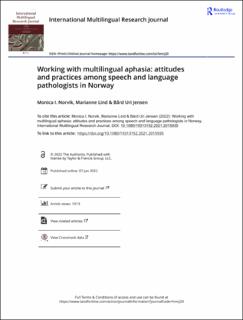Working with multilingual aphasia: attitudes and practices among speech and language pathologists in Norway
Peer reviewed, Journal article
Published version
Permanent lenke
https://hdl.handle.net/11250/3039551Utgivelsesdato
2022Metadata
Vis full innførselSamlinger
Originalversjon
International Multilingual Research Journal. 2022, 1-18. 10.1080/19313152.2021.2015935Sammendrag
The growing number of elderly multilingual speakers suffering from strokes and aphasia requires a change in the services of speech and language pathologists (SLPs), who will be serving culturally and linguistically diverse individuals to an increasing extent. Two American studies have shown that a majority of SLPs who work with multilingual adults in the US felt that their academic and clinical training had left them insufficiently prepared for working with multilingual persons with aphasia (MPWAs). This insecurity may have considerable negative consequences for MPWAs and their families. Little is known about the generalizability of these studies; hence the objective of the present study is to investigate whether the US situation is comparable to a European country with different demographics. A web-based questionnaire was administered to SLPs in Norway, examining multiple factors regarding work setting, professional training, clinical tools and procedures, and service delivery issues with MPWAs. Overall, the results are in line with Centeno’s, showing that SLPs make sensible decisions to serve MPWAs despite inadequate education programmes, shortcomings in clinical training, and limited clinical resources. The results are discussed in terms of their implications for professional education and the measures needed to minimize present shortcomings in service delivery to MPWAs

